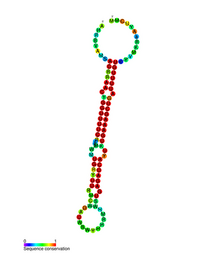Biology:Bantam microRNA
| bantam | |
|---|---|
 A secondary structure and sequence conservation diagram for Bantam microRNA. | |
| Identifiers | |
| Symbol | bantam |
| Rfam | RF00727 |
| miRBase family | MIPF0000153 |
| Other data | |
| RNA type | microRNA |
| Domain(s) | Eukaryota; |
| PDB structures | PDBe |
In molecular biology bantam microRNA is a short RNA molecule. MicroRNAs function to regulate the expression levels of other genes by several mechanisms.
Function
In Drosophila, bantam microRNA works in the epithelial cells where it regulates the growth of dendrites in sensory neurons.[1] The Hippo signaling pathway also tends to be directly linked with the BANTAM microRNA as it regulates it to control the functionality of cell proliferation and survival.[2][3] Recent studies show that human miRNA are also related to this pathway.[3] Homothorax (Hth) and Teashirt (Tsh) are two DNA-binding transcription factors expressed in the Drosophila eye imaginal disc. Recent studies have shown that the Hth and Tsh which are found to be important in cell survival of the Drosophila anterior optimal disc participate in the regulation of the Bantam miRNA.[2] It is concluded that the miRNA has an important function in the central pacemaker of the Drosophila circadian rhythm clock. To be more precise Bantam miRNA has an important relation with the clock component clk, thus making it an important factor of study regarding its role in the Drosophila behavior.[4]
Diseases
Fragile X syndrome disease are implicated to be regulated by the FMRP, an RNA-binding protein. Studies on Drosophila has shown that the Bantam miRNA plays an important role in the regulation of the protein dFMRP and also genetically interact with the protein in stem cell maintenance.[5] Thus implicating the possibility of a relation between the miRNA and the disease. It is also suggested that the endogenous expression of the Bantam gene in the developing eye imaginal disc contributes to controlling the level of hid-induced apoptosis, which is normally involved in reducing cell number in the pupal eye disc.[6]
See also
References
- ↑ "The microRNA bantam functions in epithelial cells to regulate scaling growth of dendrite arbors in drosophila sensory neurons". Neuron 63 (6): 788–802. 2009. doi:10.1016/j.neuron.2009.08.006. PMID 19778508.
- ↑ 2.0 2.1 "Transcription factor choice in the Hippo signaling pathway: homothorax and yorkie regulation of the microRNA bantam in the progenitor domain of the Drosophila eye imaginal disc". Genes Dev 23 (19): 2307–19. 2009. doi:10.1101/gad.1820009. PMID 19762509.
- ↑ 3.0 3.1 "The Hippo pathway regulates the bantam microRNA to control cell proliferation and apoptosis in Drosophila". Cell 126 (4): 767–74. 2006. doi:10.1016/j.cell.2006.07.013. PMID 16923395.
- ↑ "A role for microRNAs in the Drosophila circadian clock.". Genes Dev. 23 (18): 2179–91. 2009. doi:10.1101/gad.1819509. PMID 19696147.
- ↑ Orr, Harry, ed (2009). "The bantam microRNA is associated with drosophila fragile X mental retardation protein and regulates the fate of germline stem cells". PLOS Genet 5 (4): e1000444. doi:10.1371/journal.pgen.1000444. PMID 19343200.
- ↑ "bantam encodes a developmentally regulated microRNA that controls cell proliferation and regulates the proapoptotic gene hid in Drosophila". Cell 113 (1): 25–36. 2003. doi:10.1016/S0092-8674(03)00231-9. PMID 12679032.
External links
 |

